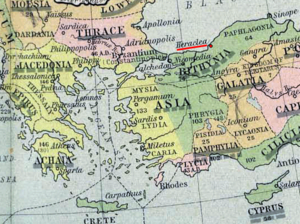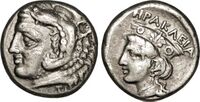هرقليا الپنطية
Ἡράκλεια Ποντική | |
 Map indicating Heraclea Pontica (underlined in red) during the Roman expansion in 264 BC | |
خطأ: إحداثيات غير صالحة. | |
| الاسم البديل | Heraclea Pontica |
|---|---|
| المكان | قرة دنيز إرغلي، محافظة زنگلداك، تركيا |
| المنطقة | بيثينيا |
| الإحداثيات | 41°17′5″N 31°24′53″E / 41.28472°N 31.41472°E |
| التاريخ | |
| الباني | مستعمرون من مگارا |
| تأسس | بين 560–558 ق.م. |
| الفترات | اليونان العتيقة |
هرقليا الپنطية ( Heraclea Pontica ؛ /ˌhɛrəˈkliːə ˈpɒntɪkə/; باليونانية: Ἡράκλεια Ποντική), known in Byzantine and later times as Pontoheraclea (باليونانية: Ποντοηράκλεια)، كانت مدينة قديمة على ساحل بيثينيا في آسيا الصغرى، at the mouth of the river Lycus. It was founded by the Greek city-state of مگارا[1] in approximately 560–558 BC and was named after Heracles who the Greeks believed entered the underworld at a cave on the adjoining Archerusian promontory (Cape Baba). المكان هو اليوم موقع المدينة الحديثة قرة دنيز إرغلي، في محافظة زنگلداك في تركيا.
The colonists soon subjugated the native Mariandynians but agreed to terms that none of the latter, now helot-like serfs, be sold into slavery outside their homeland. Prospering from the rich, fertile adjacent lands and the sea-fisheries of its natural harbor, Heraclea soon extended its control along the coast as far east as Cytorus (Gideros, near Cide), eventually establishing Black Sea colonies of its own (Cytorus, Callatis and Chersonesus). It was the birthplace of the philosopher Heraclides Ponticus.
The prosperity of the city, rudely shaken by the Galatians and the Bithynians, was utterly destroyed in the الحروب المثريداتية.
The Greek historical author Memnon of Heraclea (fl. 1st century AD) wrote a local history of Heraclea Pontica in at least sixteen books. The work has perished, but Photius's Bibliotheca preserves a compressed account of books 9–16, seemingly the only ones extant in his day. These books run from the rule of the tyrant Clearchus (c. 364–353 BC) to the later years of Julius Caesar (c. 40 BC) and contain many colorful accounts including the Bithynian introduction of the barbarian Gauls into Asia where they first allied themselves with the Heracleans and later turned violently against them.
Then, Heraclea Pontica was part of the (Eastern) Roman Empire for more than 1000 years. The Turks ravaged the area after the Battle of Mantzikert in 1071. David Komnenos, brother of the ruler of Trebizond Alexios I of Trebizond, took Heraclea Pontica in 1205 and made it capital of his domain, called Paphlagonia; he lost it in 1214 to Theodore I Laskaris, who made it a major frontier bulwark. The Genoese had a colony there after 1261. When the Turks conquered Paphlagonia in 1360, Genoa bought the city from the weakening Byzantine Empire. Heraclea developed as a trading centre of the Genoese, who settled there in large numbers. A ruined citadel on a height overlooking the town is a remnant of this period. The Italian name of the city was Pontarachia.[2] The Genoese held the city until the Ottomans captured it after 1453.[3][4]
الأساطير
Heraclea Pontica is one of the most famous cities visited by the Argonauts . According to mythology, Jason , Orpheus , Hercules and others sailed on the Argo ship on their way to the distant land of Colchis for the Golden Fleece . It was here that Hercules performed one of his 12 labors: he defeated the dog guarding the entrance to the caves leading to the underworld of the god Hades , and descended into the kingdom of the dead. In the first centuries of our era, these caves were used as a secret place of worship by the early Christians .
أشخاص بارزون
- Herodorus, mythographer, born in Heraclea.[5]
- Heraclides Ponticus, philosopher and astronomer, born in Heraclea[6]
- Xenagoras (historian), historian[7]
- Memnon of Heraclea, historian
- Bryson of Heraclea, mathematician and sophist
- Clearchus of Heraclea, tyrant of Heraclea
- Timotheus of Heraclea, son of Clearchus and succeeded him after his death
- Chion of Heraclea, a disciple of Plato who helped in the assassination of the tyrant Clearchus
- Oxyathres of Heraclea, tyrant of Heraclea
- Chamaeleon, philosopher
- Promathidas of Heraclea, historian[8][9]
- Marcian of Heraclea, geographer
- Nicetas of Heraclea, Metropolitan of Heraclea
- Dionysius of Heraclea, tyrant of Heraclea
- Amastris, tyrant of Heraclea, niece to Persian King Darius III
- Diogenianus, a Greek grammarian
انظر أيضاً
الهامش
- ^ For report of Boeotian involvement see Pausanias 5.26.7
- ^ "Genoese portolan nautical chart. The oldest original cartographic artifact in the Library of Congress. Second quarter of the 14th century".
- ^ Kazhdan, Alexander P. - The Oxford Dictionary of Byzantium - Volume 2 (1991, Oxford University Press), entry "Herakleia Pontike"
- ^ "Encyclopedia Britannica - entry 'Ereğli'".
- ^ Moore, Christopher (May 2017). "Heracles the Philosopher (Herodorus, Fr. 14)". The Classical Quarterly. Cambridge University Press. 67 (1): 27–48. doi:10.1017/S0009838817000404.
- ^
 Smith, William, ed. (1854–1857). "Heraclea". Dictionary of Greek and Roman Geography. London: John Murray.
Smith, William, ed. (1854–1857). "Heraclea". Dictionary of Greek and Roman Geography. London: John Murray.
- ^ Suda Encyclopedia, nu.598
- ^ Athenaeus, Deipnosophistae, §11.77
- ^ Athenaeus, Deipnosophistae, §7.2957
المراجع
- This article incorporates text from a publication now in the public domain: Chisholm, Hugh, ed. (1911). . دائرة المعارف البريطانية. Vol. 13 (eleventh ed.). Cambridge University Press. p. 308.
{{cite encyclopedia}}: Cite has empty unknown parameter:|coauthors=(help) - "Outpost of Hellenism: The Emergence of Heraclea on the Black Sea", Stanley Mayer Burstein, University of California Publications: Classical Studies, 14 (Berkeley, 1976).
وصلات خارجية
- Pages using gadget WikiMiniAtlas
- Wikipedia articles incorporating a citation from the DGRG without Wikisource reference
- Short description is different from Wikidata
- Coordinates on Wikidata
- Articles containing Greek-language text
- مقالات المعرفة المحتوية على معلومات من دائرة المعارف البريطانية طبعة 1911
- Wikipedia articles incorporating text from the 1911 Encyclopædia Britannica
- Milesian Pontic colonies
- اليونان الپنطية
- هرقليا الپنطية
- تاريخ قرة دنيز إرغلي
- مستعمرات يونانية في بيثينيا
- أماكن مأهولة في بيثينيا
- مستعمرات مگارية
- أماكن مأهولة تأسست في القرن السادس ق.م.
- أعضاء العصبة الدلية
- أماكن مأهولة في الامبراطورية البيزنطية


